The AMD Ryzen Threadripper 1950X and 1920X Review: CPUs on Steroids
by Ian Cutress on August 10, 2017 9:00 AM ESTCPU Legacy Tests
Our legacy tests represent benchmarks that were once at the height of their time. Some of these are industry standard synthetics, and we have data going back over 10 years. All of the data here has been rerun on Windows 10, and we plan to go back several generations of components to see how performance has evolved.
All of our benchmark results can also be found in our benchmark engine, Bench.
3D Particle Movement v1
3DPM is a self-penned benchmark, taking basic 3D movement algorithms used in Brownian Motion simulations and testing them for speed. High floating point performance, MHz and IPC wins in the single thread version, whereas the multithread version has to handle the threads and loves more cores. This is the original version, written in the style of a typical non-computer science student coding up an algorithm for their theoretical problem, and comes without any non-obvious optimizations not already performed by the compiler, such as false sharing.
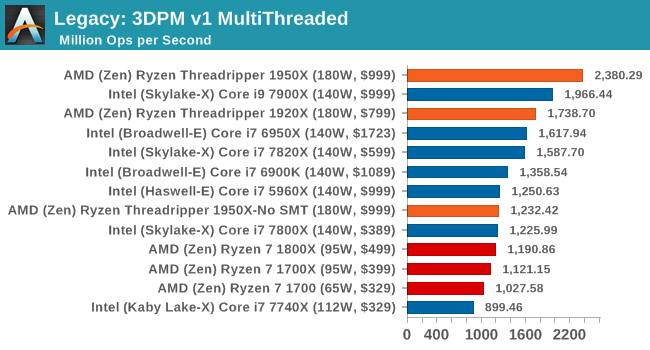
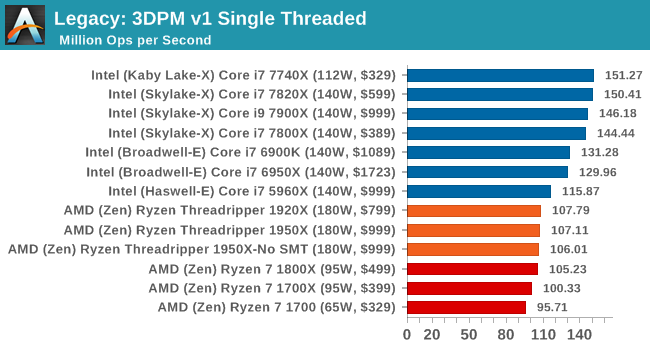
CineBench 11.5 and 10
Cinebench is a widely known benchmarking tool for measuring performance relative to MAXON's animation software Cinema 4D. Cinebench has been optimized over a decade and focuses on purely CPU horsepower, meaning if there is a discrepancy in pure throughput characteristics, Cinebench is likely to show that discrepancy. Arguably other software doesn't make use of all the tools available, so the real world relevance might purely be academic, but given our large database of data for Cinebench it seems difficult to ignore a small five minute test. We run the modern version 15 in this test, as well as the older 11.5 and 10 due to our back data.
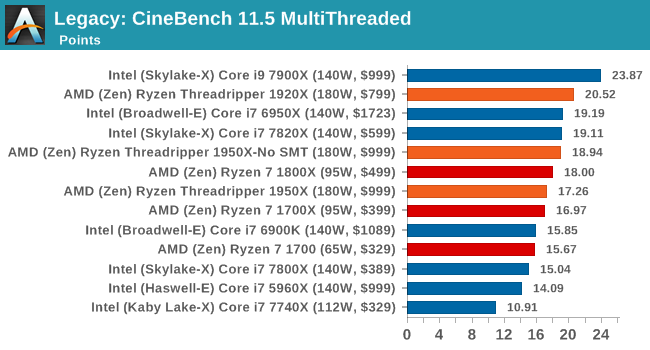
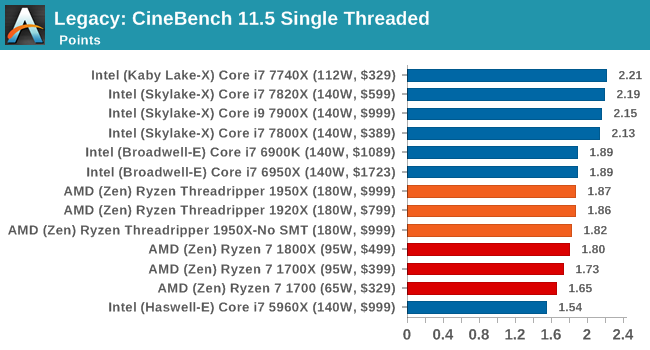
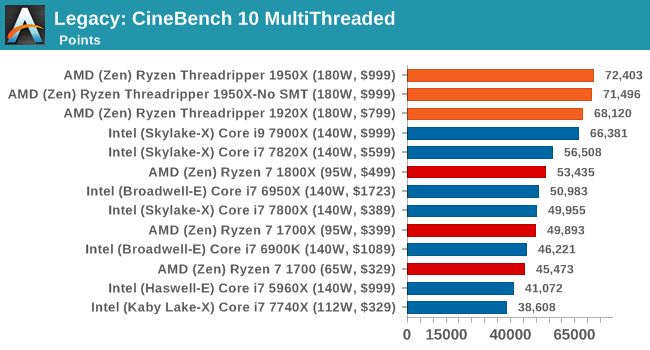
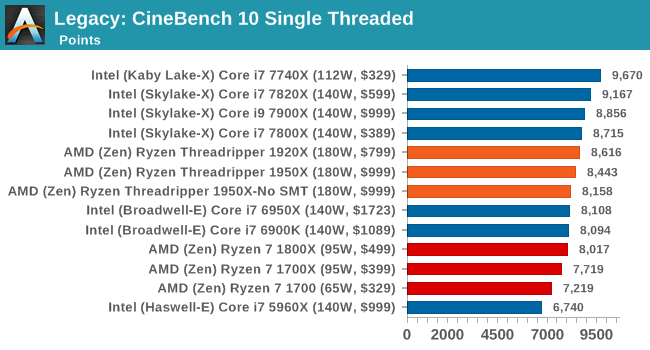
x264 HD 3.0
Similarly, the x264 HD 3.0 package we use here is also kept for historic regressional data. The latest version is 5.0.1, and encodes a 1080p video clip into a high-quality x264 file. Version 3.0 only performs the same test on a 720p file, and in most circumstances the software performance hits its limit on high-end processors, but still works well for mainstream and low-end. Also, this version only takes a few minutes, whereas the latest can take over 90 minutes to run.
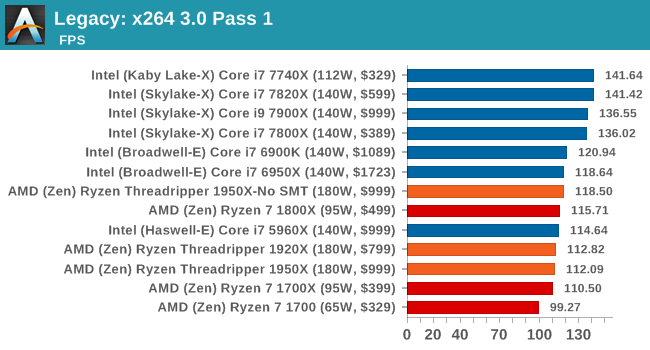
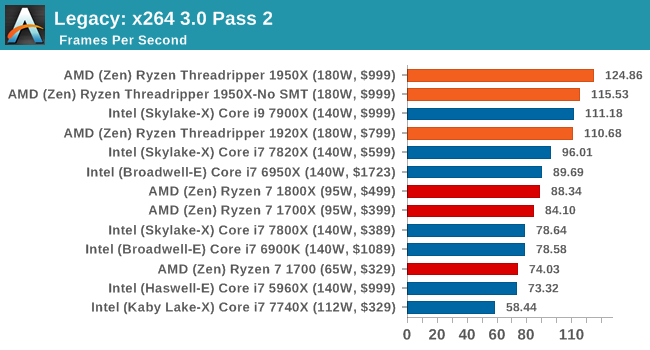
The 1950X: the first CPU to score higher on the 2nd pass of this test than it does on the first pass.










347 Comments
View All Comments
BOBOSTRUMF - Friday, August 11, 2017 - link
Actually Intel's 140 can consume more than 210 if You want the top unrestricted performance limited. Read tomshardware reviewFiliprino - Thursday, August 10, 2017 - link
How comes WinRAR is faster with the 10 core Broadwell than with the 10 core Skylake?What did they change on Cinebench going from 10 to 11.5? Threadripper is the faster CPU in Cinebench 10, but in the newer one it is not. Then again Cinebench 15 shows TR as the faster CPU. Is this benchmark reliable?
How comes Chromium compilation is so slow? Others have pointed out they get much better scaling (linear speedup). That makes sense because compilation basically consists in launching isolated processes (compiler instances). Is this related with the segfaulting problem under GNU/Linux systems?
For encoding I would start to use FFmpeg when benchmarking so many cores. In my brain lies a memory of FFmpeg being faster than Handbrake for the same number of cores. Maybe the GUI loop interrupts the process in a performance-unfriendly way. Too much overhead. HPC workloads can suffer even from the network driver having too many interrupts (hence, Linux tickless configuration).
I have read SYSMARK Results and I find strange that TR media results are slower than data, being TR slower than Intel in media and faster than Intel in data. Isn't SYSMARK from BAPCo (http://www.pcworld.com/article/3023373/hardware/am... You already point it out on the article, sorry.
How comes R9 Fury in Shadow of Mordor has AMD and Intel CPUs running consistently at two different frame rates (~95 vs ~103)?
The same but with the GTX 1080. Both cases happen regardless of the Intel architecture (Haswell, Broadwell and Skylake all have the same FPS value).
What happens with NVIDIA driver on Rocket League? Bad caching algorithm (TR has more cores/threads -> more cache available to store GPU command data)? You say you had issues but, what are your thoughts?
How comes GTA V has those Under 60 and 30 FPS graphs knowing that the game is available for PS4 and XBox One (it has been already optimized for two CCX CPU, at least there is a version for that case)? Nevertheless, with NVIDIA cards, 2 seconds out of 90 is not that much.
What I can think is that all these benchmarks are programmed using threading libraries from the "good old times" due to bad scaling. And in some cases there is architecture-specific targeted code. I also include in my conception the small dataset being used. I also would not make a case out of a benchmark programmed with code having false sharing (¡:O!)
Currently for gaming, it seems that the easiest way is to have a Virtual Machine with PCIe passthrough pinned to one of the MCM dies.
As a suggestion to Anandtech, I would like to see more free (libre) software being used to measure CPU performance, compiling the benchmarks from source against the target CPU architecture. Something like Phoronix. Maybe you could use PTS (Phoronix Test Suite).
Filiprino - Thursday, August 10, 2017 - link
Positive things: ThreadRipper is under its TDP consumption. Intel is more power hungry. The Intel 16-core might go through the rough in power consumption.Good gaming performance. Intel is generally better, but TR still offers a beefy CPU for that too, losing a few frames only.
Strong rendering performance.
Strong video encoding performance.
When you talk about IPC, it would be useful to measure it with profiling tools, not just getting "points", "miliseconds" and "seconds".
Seeing how these benchmarks do not scale by much beyond 10 cores you might realize software has to get better.
Chad - Thursday, August 10, 2017 - link
Second ffmpeg test (pretty please!)mapesdhs - Thursday, August 10, 2017 - link
Ian, a query about the CPU Legacy Tests: why do you reckon does the 1920X beat both 1950X and 1950X-G for CB 11.5 MT, yet the latter win out for CB 10 MT? Is there a max-thread limit in V11.5? Filiprino asked much the same above.
"...and so losing half the threads in Game Mode might actually be a detriment to a workstation implementation."
Isn't that the whole point though? For most workstation tasks, don't use Game Mode. There will be exceptions of course, but in general...
Btw, where's C-ray? ;)
Ian.
Da W - Thursday, August 10, 2017 - link
ALL OF YOU COMPLAINERS: START A TECH REVIEW WEBSITE YOURSELVES AND STFU!hansmuff - Thursday, August 10, 2017 - link
Don't read the comments. Also, a lot of the "complaints" are read by Ryan and he actually addresses them and his articles improve as a result of criticism. He's never been bad, but you can see an ascension in quality over time, along with his partaking in critical commentary.IOW, we don't really need a referee.
hansmuff - Thursday, August 10, 2017 - link
And of course I mean Ian, not Ryan.mapesdhs - Friday, August 11, 2017 - link
It is great that he replies at all, and does so to quite a lot of the posts too.Kepe - Thursday, August 10, 2017 - link
Wait a second, according to AMD and all the other articles about the 1950X and Game Mode, game mode disables all the physical cores of one of the CPU clusters and leaves SMT on, so you get 8 cores and 16 threads. It doesn't just turn off SMT for a 16 core / 16 thread setup.AMD's info here: https://community.amd.com/community/gaming/blog/20...